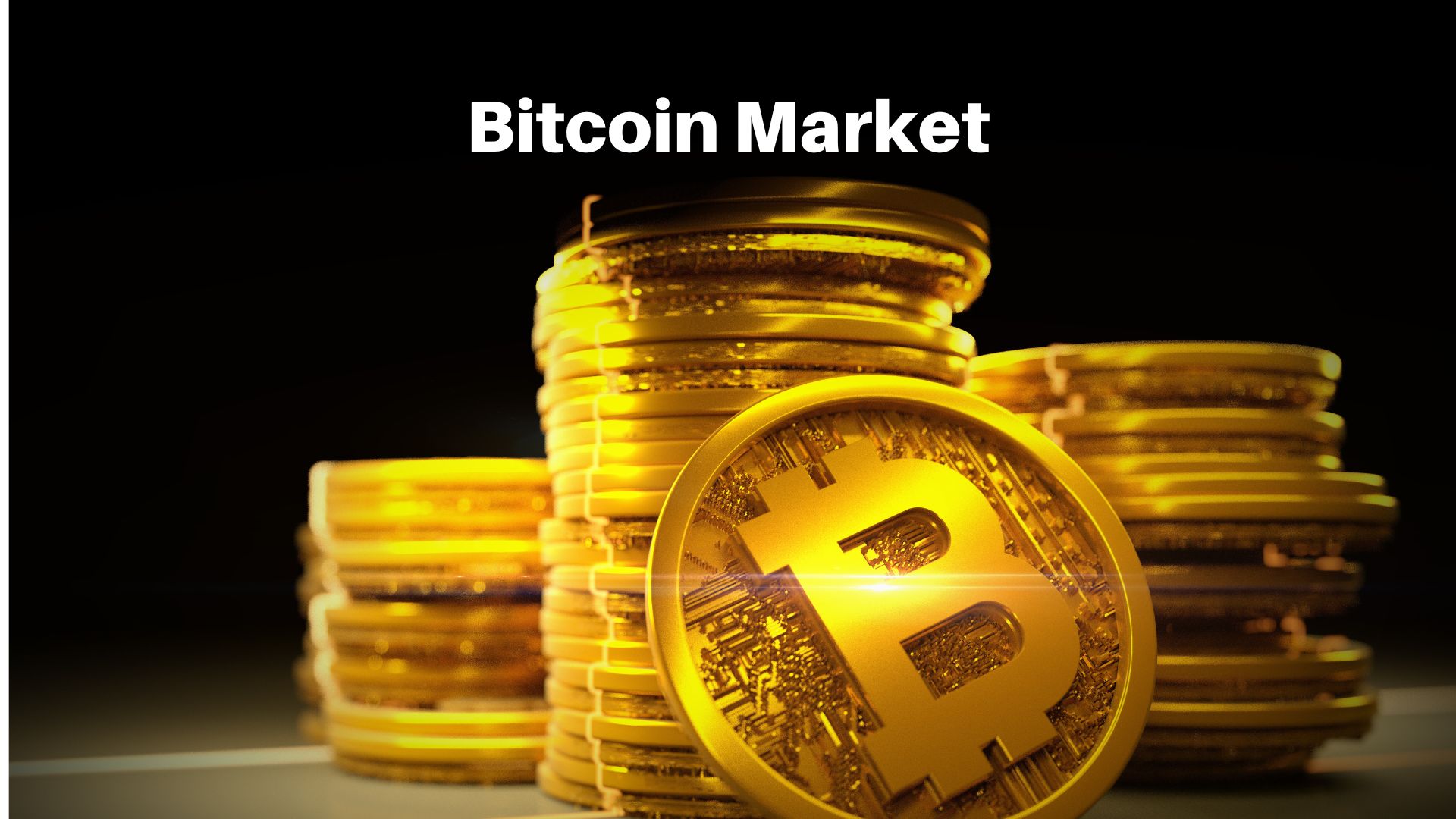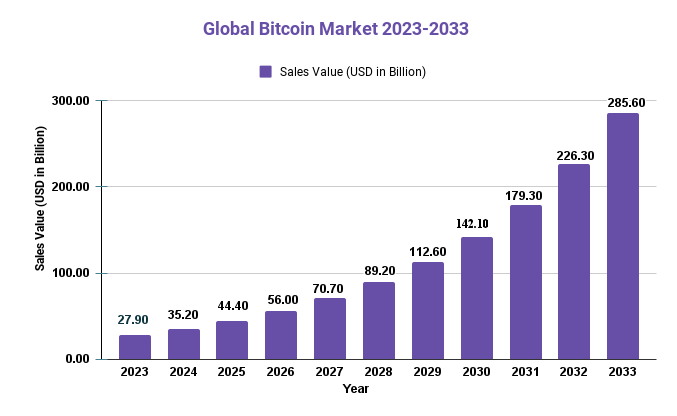Bitcoin Market Sales to Top USD 285.6 Billion in Revenues by 2033 at a CAGR of 26.2% | Data By Market.us

Page Contents
Market Overview
Published Via 11Press: Bitcoin Market is a decentralized digital currency that enables peer-to-peer transactions without the need for intermediaries such as banks or governments. It was created in 2009 by an anonymous person or group of people using the pseudonym Satoshi Nakamoto. Bitcoin operates on a blockchain network, which is essentially a public ledger that records all transactions made with the cryptocurrency.
Global Bitcoin Market was valued at USD 27.9 Bn in 2023 and is projected to increase significantly USD 285.6 Bn in 2033 at a CAGR of 26.2% from 2023 to 2033.
The supply of Bitcoin is limited to 21 million coins, with approximately 18.7 million already in circulation as of January 2021. The value of bitcoin is determined by supply and demand in the market, similar to traditional currencies like the US dollar or Euro. However, due to its decentralized nature and lack of government regulation, bitcoin's value can be highly volatile and subject to rapid fluctuations.
Despite its volatile nature, bitcoin has gained popularity among investors seeking to diversify their portfolios and hedge against inflationary pressures. Additionally, some merchants accept Bitcoin as payment for goods and services, further increasing its adoption and use in everyday transactions.

Key Takeaways
- Bitcoin is highly volatile and subject to sudden swings due to market sentiment or government regulations.
- Bitcoin's market capitalization, or the sum of all Bitcoins currently in circulation, has seen significant growth since 2009 but remains a marginal asset class when compared with traditional investments like stocks or bonds.
- Due to the limited supply of Bitcoin (21 million), and growing adoption and demand, Bitcoin's value has seen a substantial surge. Unfortunately, it also experienced significant decreases in value, with one notable crash occurring in 2018.
- Bitcoin's use and adoption have been hindered by regulatory obstacles in some countries. On the other hand, other nations have welcomed Bitcoin with open arms as an asset class.
- Bitcoin has been likened to gold as a store of value. Proponents argue that Bitcoin can serve as insurance against market volatility and inflation. Nevertheless, its status as a safe-haven asset remains controversial within the financial community.
- Bitcoin trading is highly speculative. Many investors buy and sell based on short-term price movement. As a result, the market can experience crashes or bubbles.
- Bitcoin has seen incredible success despite its volatility and regulatory issues, becoming an increasingly attractive investment option for those seeking to diversify their portfolios.
Get the sample pages of report@ https://market.us/report/bitcoin-market/request-sample/
Regional Snapshot
- North America: North America has a significant number of Bitcoin wallet providers and exchanges, with the United States being an early adopter. However, the regulatory framework for Bitcoin in North America varies by state or province.
- Europe: Europe boasts an extremely liberal regulatory system for Bitcoin. Many countries have accepted it as a legitimate asset class and have acknowledged its legitimacy. Switzerland especially has an active Bitcoin ecosystem, with high adoption rates observed there.
- Asia-Pacific: Asia has been a major driver of Bitcoin adoption, with countries like South Korea and Japan recognising it as legal payment methods. China however has had more stringent regulations regarding cryptocurrency with frequent restrictions placed on Bitcoin exchanges.
- Latin America: Latin America has seen a tremendous surge in Bitcoin adoption, particularly Venezuela and other countries where there has been hyperinflation. Bitcoin is seen as an opportunity to protect from inflation and preserve value.
- Africa: While Bitcoin adoption is still in its early stages, there are ample growth prospects. South Africa and Nigeria have experienced high volumes of Bitcoin trading, as well as an uptick in the use of digital money as a replacement for traditional banking systems.
Drivers
Blockchain can reduce ownership costs.
Bitcoin transactions leverage cryptography and the blockchain principle, offering cheaper, faster transfers than traditional methods while being more secure and dependable. This will lead to an even wider global market expansion in the future with minimal exchange rates, interest rates, and fees for international purchases.
Decentralized Ledger
Distributed ledger technologies offer a decentralized payment model for digital currency systems by eliminating the need for centralized intermediary processing. Financial transactions can be tracked thanks to distributed headline technology, creating virtual money that facilitates virtual tracking and exchange of any value. Blockchain acts as an information-sharing platform while being one type of distributed ledger which enhances real-time security within the digital economy. Such factors may influence cryptocurrency prices in years ahead.
Restraint
Inadequate Regulation
The market for bitcoins is still unregulated. One of the greatest barriers to the adoption of cryptocurrencies at the moment is the absence of rules and the uncertainty surrounding it. Regulators continue to remain one of the biggest barriers to the acceptance of Bitcoin, even if they are working to create universal cryptocurrency guidelines. Distributed leader technology is still in its early stages, thus it presents regulators and policymakers with a wide range of challenges on a national and worldwide scale.
Opportunities
- Investment: Since Bitcoin's price has increased significantly over the years, many investors believe it to be a promising investment option. The fact that institutional investors like hedge funds, mutual funds, and pension funds are beginning to invest in Bitcoin shows how well-accepted cryptocurrencies are as valid asset classes.
- Bitcoin can be used to make payments for both domestic and international transactions. It gives customers an alternative to costly and cumbersome traditional payment methods.
- Remittances: Bitcoin is a popular choice for remittances since it can be used to move money cheaply across borders. For those who reside in nations with high remittance fees, this is especially important.
Challenges
- Volatility: Bitcoin's price is highly volatile, and its worth can change drastically within a short period of time. As such, investing in bitcoin could prove to be a risky endeavor; investors stand the chance of losing a substantial portion of their funds.
- Regulatory Challenges: The legal status of Bitcoin varies from country to country and it operates within an undefined regulatory gray area. This uncertainty makes it difficult for investors and firms to operate successfully within the market.
- Bitcoin is vulnerable to fraud, theft and security risks. A hacker could take control of a user's Bitcoin if they have access to their private key. Furthermore, hackers could gain access to Bitcoin exchanges and wallets, leading to substantial financial losses.
- Bitcoin continues to gain acceptance, yet remains relatively niche compared to traditional investing. This may limit its potential growth and make it more challenging for investors to access the market.
- Environmental Impact: Given how much energy Bitcoin mining requires, there have been concerns about its effect on the environment. Most Bitcoin mining utilizes fossil fuels which contributes to increased carbon emissions and climate change effects.
Interested to Procure the Data? Inquire here at: https://market.us/report/bitcoin-market/#inquiry
Type of Mining
- Hardware-Based
- Cloud-Based
Exchanges
- Small Exchange
- Large Exchange
Key Players
- ANXBTC Bitcoin Exchange
- Express coin
- Coin base Inc.
- Bit Pay
- 1Hash
- Ant Pool
- Bit Fury
- com
- com Via BTC
- F2Pool
- HaoBTC
- SlushPoo
Recent Developments
- Institutional Adoption: Institutional investors have started to invest in Bitcoin, and several companies have added it to their balance sheets – such as Tesla and Square – leading to an increased mainstream acceptance of this digital currency.
- Regulatory Developments: Governments around the world have begun to regulate Bitcoin and other cryptocurrencies. In 2021, China announced a crackdown on Bitcoin mining and trading, while in 2020 the U.S. Securities and Exchange Commission (SEC) delayed approval of a Bitcoin ETF.
- Environmental Concerns: Growing concerns have been expressed regarding the environmental effects of Bitcoin mining, which consumes a great deal of energy. To combat these worries, many Bitcoin mining companies have pledged to use renewable sources of power.
- NFTs: Non-fungible tokens (NFTs) have seen a meteoric rise in popularity on the cryptocurrency market, with several high-profile sales. NFTs are unique digital assets that can represent ownership over artwork, music and other creative works.
- Bitcoin Upgrades: The Bitcoin network has undergone several upgrades to enhance its functionality and scalability. In 2021, the Taproot upgrade was approved which will enhance privacy and efficiency in Bitcoin transactions.
- Increased Acceptance: Bitcoin and other cryptocurrencies have gained acceptance as payment methods. Major companies, such as PayPal and Visa, now support transactions utilizing bitcoins.
Report Scope
| Report Attribute | Details |
| Forecast Years: | 2023-2033 |
| Historical Years: | 2017-2022 |
| Revenue 2023: | USD 27.9 Bn |
| Revenue 2033: | USD 285.6 Bn |
| Revenue CAGR (2023 – 2033): | 26.2% |
| Fastest Growing Region | Asia Pacific |
| Largest Region | North America |
| Report Scope | Market Trends, Drivers, and Restraints; Revenue Estimation and Forecast 2023-2033; Segmentation Analysis; Impact of COVID-19; Companies’ Strategic Developments; Market Share Analysis of Key Players; Company Profiling |
| Regional Coverage & Country Coverage | 5 Regions & Top 22 Countries
|
| Short-Term Projection Year | 2028 |
| Long-Term Projected Year | 2033 |
FAQ of Bitcoin Market
What is the size of the global Bitcoin market?
Global Bitcoin Market was valued at USD 27.9 Bn in 2023 and is projected to increase significantly by USD 285.6 Bn in 2033 at a CAGR of 26.2% from 2023 to 2033.
What is the global Bitcoin market?
The global Bitcoin market refers to the market for the cryptocurrency Bitcoin on a worldwide scale. It includes exchanges, mining operations, and other services related to Bitcoin.
What is the future of the global Bitcoin market?
The future of the global Bitcoin market is uncertain, and it is difficult to predict what will happen in the long term. However, many people believe that Bitcoin has the potential to disrupt traditional financial systems and become a widely accepted asset class.
Contact us
Contact Person: Mr. Lawrence John
Market.us (Powered By Prudour Pvt. Ltd.)
Tel: +1 718 618 4351
Send Email: [email protected]
The team behind market.us, marketresearch.biz, market.biz and more. Our purpose is to keep our customers ahead of the game with regard to the markets. They may fluctuate up or down, but we will help you to stay ahead of the curve in these market fluctuations. Our consistent growth and ability to deliver in-depth analyses and market insight has engaged genuine market players. They have faith in us to offer the data and information they require to make balanced and decisive marketing decisions.